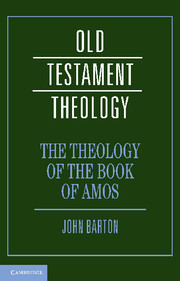Book contents
- Frontmatter
- Contents
- General Editors’ Preface
- Preface
- Abbreviations
- Chapter 1 Amos: The Critical Issues
- Chapter 2 Religious Belief and Practice in Amos’s Day
- Chapter 3 The Theology of Amos and His Circle
- Chapter 4 Theological Themes in the Additions to the Book of Amos
- Chapter 5 The Theology of the Book of Amos
- Chapter 6 The Reception of the Theology of Amos
- Chapter 7 The Theology of Amos Then and Now
- Further Reading
- Author Index
- Scripture and Apocrypha Index
General Editors’ Preface
Published online by Cambridge University Press: 05 June 2012
- Frontmatter
- Contents
- General Editors’ Preface
- Preface
- Abbreviations
- Chapter 1 Amos: The Critical Issues
- Chapter 2 Religious Belief and Practice in Amos’s Day
- Chapter 3 The Theology of Amos and His Circle
- Chapter 4 Theological Themes in the Additions to the Book of Amos
- Chapter 5 The Theology of the Book of Amos
- Chapter 6 The Reception of the Theology of Amos
- Chapter 7 The Theology of Amos Then and Now
- Further Reading
- Author Index
- Scripture and Apocrypha Index
Summary
General Editors’ Preface
Some years ago, Cambridge University Press, under the editorship of James D. G. Dunn, initiated a series entitled New Testament Theology. The first volumes appeared in 1991 and the series was brought to completion in 2003. For whatever reason, a companion series that would focus on the Old Testament/Hebrew Bible was never planned or executed. The present series, Old Testament Theology, is intended to rectify this need.
The reasons for publishing Old Testament Theology are not, however, confined solely to a desire to match New Testament Theology. Instead, the reasons delineated by Dunn that justified the publication of New Testament Theology continue to hold true for Old Testament Theology. These include, among other things, the facts that (1) given faculty and curricular structures in many schools, the theological study of individual Old Testament writings is often spotty at best; (2) most exegetical approaches (and commentaries) proceed verse by verse such that theological interests are in competition with, if not completely eclipsed by, other important issues, whether historical, grammatical, or literary; and (3) commentaries often confine their discussion of a book’s theology to just a few pages in the introduction. The dearth of materials focused exclusively on a particular book’s theology may be seen as a result of factors like these; or, perhaps, it is the cause of such factors. Regardless, as Dunn concluded, without adequate theological resources, there is little incentive for teachers or students to engage the theology of specific books; they must be content with what are mostly general overviews. Perhaps the most serious problem resulting from all this is that students are at a disadvantage, even incapacitated, when it comes to the matter of integrating their study of the Bible with other courses in religion and theology. There is, therefore, an urgent need for a series to bridge the gap between the too-slim theological précis and the too-full commentary where theological concerns are lost among many others.
- Type
- Chapter
- Information
- The Theology of the Book of Amos , pp. xiii - xviPublisher: Cambridge University PressPrint publication year: 2012

